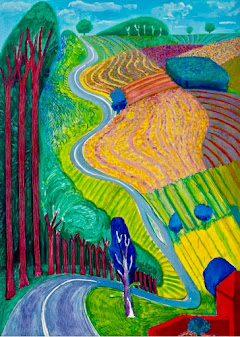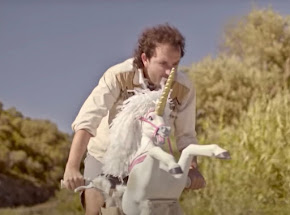“It was an April morning when they told us we should go. As I turned to you, you smiled at me, how could we say no? Oh, the fun to have, to live the dreams we always had. Oh, the songs to sing when we at last return again... Below the streets that steam and hiss, the devil's in his hole... The shackles of commitment fell in pieces on the ground. Oh, to ride the wind, to tread the air above the din. Oh, to laugh aloud dancing as we fought the crowds, yeah. To seek the man whose pointing hand, the giant step unfolds. With guidance from the curving path that churns up into stone... So fast the heart should beat as proud the head with heavy feet, yeah. Days went by when you and I, bathed in eternal summer's glow, as far away and distant our mutual child did grow... Wandering and wandering, what place to rest the search? I know the way, know the way...” Led Zeppelin, Achilles Last Stand, Presence, Swan Song Records, 1975, 10-minutes of epic rock with lyrics written by Robert Plant while recovering from a traffic accident, seems more bicycling relevant today than when released nearly half a century ago, before 20,000 saddle hours for Labann, who subsequently recounted nearly identical misgivings and thanksgivings. Seasoned wanderers will always say they’re "having fun" and "know the way". Won’t be included in official list, though friends know Bob [shown below] to be a bicyclist, while Jimmy Page sweats his way through his favorite song to perform live.

Whatever you personally reveal works to your disadvantage. Disappointments anger associates and regrets rile intimates. Saying nothing sounds sensible but makes entire world stupider, as if not ignorant enough already. If you don’t disclose thoughts and expose preferences, sometimes denigrate self, you seldom get to hear truths, though many prefer blissful serenity of jejune immaturity to a betalain face beet red from consummate embarrassment.
Writers try to censor what you’ll hear and see, champion personal causes, jealously guard ideas conceived and observations noted, set themselves up as arbiters of style and taste, and take no one’s needs into account but their own. Writers denigrate word craft as difficult and unprofitable to discourage those who would outcompete them and steal clients. Media exists to pepper you with inanity, thereby deter investigations into organized criminality. Ruthless spin interferes with making sense of each tragedy. You can’t change what occurred, but ought to learn from mistakes and plan accordingly. Reporters can’t find it in themselves to be comprehensive, courageous, honest, informed, persistent, unabashed, or unprejudiced, what it takes to tell the truth, which is why you so seldom hear any it’s hard to recognize. Easier to fill airtime with boldfaced lies. Do readers and viewers deserve better, and why does it matter? You have to explore your world for yourself anyway.
Never visit websites with barriers (click bait, forced cookies, or sign up), so content has little or no influence on Labann. Facts for free come from bicycling around, bulletin boards, direct email, documentary films, dotgovs, listservs, personal conversations, social media, or whatever blog such as B&C doesn’t advertise or otherwise restrict gathering data. Most people accept the same; anything easily found shapes opinion, while best intelligence gets dismissed or remains hidden. Public is unaware of extent of data analyses belonging to corporations and government alone. In general, most literature gets redacted or shredded, goes unpublished, or isn’t for public viewing.
But issues that could ruin your life bear close scrutiny. Does a pandemic that killed over 4 million and reduced life expectancy by 2 years make you avoid public? Does a blood red full moon from giant forest fires [here foreseen] causing a smoke cloud covering entire continent and climate crisis causing record temperatures worry you? Do random shootings nearby with no arrests, talk of defunding police, and unpunished vehicular homicide make you think civility is breaking down? Does any of these keep you from riding your bike? Leave home with reservations? Return wondering why?
Vanity Fair contributor Fran Lebowitz recently confessed, “People call me negative... I think I’m just realistic. I tell the truth... which is very rarely positive... I’m judgmental, something you’re not supposed to be... just means I have standards...What difference does it make? I don’t have any power. I’m not making any decisions for other people... People in politics make real decisions for you... Republicans... shameful and shameless... They care about nothing except retaining the power they have at the moment... It’s a cult. They’re saying if they can’t keep certain people from voting they can never win.” Strikes a chord with Labann, who's been saying the same since 1980.
Why is it that native soil can be thrown into utter turmoil when one election cycle goes awry? A chief executive is but one member of an entire government staffed by thousands of individuals among a third of a billion citizens, who appear to be mostly apathetic, asleep or naïve. Tolerance for televangelism frauds ushered in propaganda networks bent on billionaire oligarchy. Same traitors who imploded Twin Towers twenty years ago in 2001 still hold sway over Congress. Undue influence of a fake family pulling puppet strings is both disturbing and irrational.
Feel like asking Jon Stewart to retract his statement in 2011, “I feel like this country is stronger than any individual you can throw at it... I don’t think personally the damage they can do is so drastic and so great that we would ever be run off course by one individual... I pray that Trump runs. He puts his name on everything. I could put a new wing on my house if the fat guy runs.” Facetious gum flapping encourages fascism and folly.
Credentials, expertise, facts, and truth don’t matter anymore. Dropouts, incompetents, and morons agitate masses and wield power. Future anthropologists and historians will categorize Trumpists into three groups: Coconspirators who criminally profited, completely delusional nincompoops, and craven selfish clowns without empathy or remorse. Yes, something is terribly wrong in US governance: Slow to react to urgent needs, too busy stuffing pockets from trillions in tax revenue, and too conservative or liberal on wrong issues. Dolt 45 simply acknowledged this, justified his 30,000 documented lies as clever misinformation, so erased his crime lord legacy and gained celebrity supremacy. Only 24% of voters now affiliate with Republicans; scrambling to shore up a dying party, GOP denied free elections, filibustered, and gerrymandered to such an extent that they hang onto power by their fingernails.
Because nazis burn books, authors must foment dissent and write more. Certain empathetic documentaries and feature films renew focus on consequential issues rather than distracting dodges. What matters most in a cruel world is how humans evade existential threats, interact gently, trade fairly, treat one another respectfully, and utilize sustainably. In each film cited, bicycles factored in personal growth of protagonists.
A frank, gritty, teenage story set in inner-city Los Angeles, Model Minority (Lily Mariye, dir., 2012) won 11 awards. Kayla Tanaka (Nichole Bloom), an underprivileged Japanese American 16 year old bicylist, endangers her promising future as an artist when she becomes involved with a drug dealer. She barely manages to survive the treacherous world of criminal subculture, dysfunctional family, juvenile hall, and peer pressure, while dispelling notion that Orientals, who represent less than 6% of nation's population, make model Americans, while individuals independent of origin range from conservative to liberal, crooked to honest, and despicable to exemplary.
Filmed in 6 European countries, Bikes Tell Stories (Milan Lisica, dir., 2014) profiles six people for whom cycling is a way of life, where bravery means doing scary things and loss is only real if you allow it to be. The fact that change can motivate intertwines these stories, which promote cycling as an adventure, inspiration, method for self-awareness, rebirth of dreams, and therapy for mind and body.
After a Peace Corps stint in Ecuador, where only his landlord had a bicycle, David Schweidenback learned empathy and resolved to send America’s castoff bikes to developing towns as an economic aid. In 1991, Nicaraguan city of Rivas was the first to receive them, which transformed this war torn community into The Bicycle City (Greg Sucharew, dir., 2016) through simple mechanical implementation.
For a timely endeavor, cheer on and delve into USA’s underdog Olympic Women's Track Cycling Team. Personal Gold (Sky and Tamara Christopherson, dirs., 2016) describes how with minimal support they won silver for Team Pursuit in London 2012, first USA track medalists in 20 years. Male racers were excluded because of Armstrong’s doping scandal, while peloton still focuses not on amateur glory but big money. One bad apple always spoils entire barrel. In 2021, Jennifer Valente won gold in the Women’s Omnium, while in Women’s 400 Meter Hurdles Sydney McLaughlin set a new world record. USA won more gold, silver and bronze medals in Tokyo than any other participating nation.
Bicicles (Kim Kelln, dir., 2017) explains why winter cycling isn't something only hardcore elites and hearty insane do in Calgary, Alberta, Canada. Naysayers nevertheless, hundreds don mittens and toques, pedal off to work in bitter cold, and refuse to stop riding bicycles despite falling snow and hanging icicles. Documentary introduces four heroes on frozen commutes, and shares interviews with business organizations, city councillors, and men on the street in a metropolis where cycling has become increasingly mainstream.
Puerile Netflix premiere Aliens Ate My Homework (Sean McNamara, dir., 2018) has preteen bicycling cousins Rod Allbright (Jayden Greig) and Elspeth McMasters (Lauren McNamara) aiding Galactic Patrol’s hunt for rogue world killer Bakar, who’s disguised as classroom bully Billy Becker (Ty Consiglio).
Adam Ruins Everything, Season 3, Episode 8, Adam Ruins Murder (Jon Wolf, dir., 2019) lambastes law enforcers and legislators for lax handling of vehicular homicides after a bicyclist gets mowed down. Apart from cancer and cardiovascular diseases, both caused by automotive convenience and big oil carcinogens, driving badly while distracted, drowsy, drugged or drunk accounts for almost as many deaths and losses as bad diet and exercise deficit. Greed ignores duty to species, while wars for automotive resources threatens all life on planet.
Bicicles (Kim Kelln, dir., 2017) explains why winter cycling isn't something only hardcore elites and hearty insane do in Calgary, Alberta, Canada. Naysayers nevertheless, hundreds don mittens and toques, pedal off to work in bitter cold, and refuse to stop riding bicycles despite falling snow and hanging icicles. Documentary introduces four heroes on frozen commutes, and shares interviews with business organizations, city councillors, and men on the street in a metropolis where cycling has become increasingly mainstream.
Puerile Netflix premiere Aliens Ate My Homework (Sean McNamara, dir., 2018) has preteen bicycling cousins Rod Allbright (Jayden Greig) and Elspeth McMasters (Lauren McNamara) aiding Galactic Patrol’s hunt for rogue world killer Bakar, who’s disguised as classroom bully Billy Becker (Ty Consiglio).
Adam Ruins Everything, Season 3, Episode 8, Adam Ruins Murder (Jon Wolf, dir., 2019) lambastes law enforcers and legislators for lax handling of vehicular homicides after a bicyclist gets mowed down. Apart from cancer and cardiovascular diseases, both caused by automotive convenience and big oil carcinogens, driving badly while distracted, drowsy, drugged or drunk accounts for almost as many deaths and losses as bad diet and exercise deficit. Greed ignores duty to species, while wars for automotive resources threatens all life on planet.







































